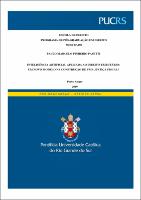| Share record |


|
Please use this identifier to cite or link to this item:
https://tede2.pucrs.br/tede2/handle/tede/8667| Document type: | Dissertação |
| Title: | Inteligência artificial aplicada ao direito tributário : um novo modelo na construção de uma justiça fiscal? |
| Author: | Pasetti, Paulo Marcelo Pinheiro  |
| Advisor: | Silveira, Paulo Antônio Caliendo Velloso da |
| Abstract (native): | O cenário contemporâneo oferece a oportunidade de pensar a relação do Direito com a Inteligência Artificial. Assim, no que diz respeito especificamente às tratativas entre contribuintes e Fisco, esta pesquisa estrutura-se em torno da questão: a utilização de Inteligência Artificial aplicada ao Direito Tributário é possível como um novo modelo na construção de uma justiça fiscal? Para levar a cabo essa indagação, o objetivo geral é identificar como a Inteligência Artificial pode auxiliar na correção da equação entre deveres e direitos fundamentais, a fim de melhorar a organização social e a redistribuição de riqueza, tendo como base os princípios da solidariedade, da dignidade da pessoa humana, da capacidade contributiva e da capacidade colaborativa. Como objetivos específicos, busca-se (a) entender o problema da textura aberta em sistema especialista legal; (b) averiguar a polêmica sobre o valor da confidencialidade fiscal na sociedade; (c) identificar se existe à disposição do Fisco tecnologia que permita o cruzamento de pagamentos indevidos de tributos; e (d) avaliar a viabilidade de restituição do indébito tributário “ex officio” pela Administração Pública. A análise dos temas é desenvolvida a partir das fontes primárias, tais como o são a legislação vigente, a doutrina nacional e estrangeira, bem como precedentes que tratem do assunto. Também é utilizada, como técnica secundária, pesquisa e leitura de publicações a respeito da problemática em questão. O método de abordagem teórica desta dissertação é lógico-dedutivo. Os resultados viabilizam dizer que, se a tecnologia da informação pode auxiliar fortemente nas formas de organização das cobranças fiscais, pode da mesma maneira auxiliar na devolução espontânea do tributo recolhido indevidamente. Assim, ferramentas de controle podem ser criadas ou melhoradas para estruturar tanto as cobranças quanto as devoluções de que tenha de lançar mão a Administração Pública. Nesses termos, assegurar a confiança na relação Estado-contribuinte é necessário. |
| Abstract (english): | The contemporary scenario offers the opportunity to think about the relationship stablished between Law and Artificial Intelligence. This way, concerning specifically to taxpayers and tax authorities, this research is structured around the question: is it possible the usage of Artificial Intelligence applied to Tax Law as a new model in the construction of a Tax Justice? In order to carry out this inquiry, the main goal consists to identify how Artificial Intelligence can manage to correct the equation between fundamental duties and rights, aiming to improve social organization and redistribution of wealth, based on the principles of solidarity, human dignity, contributive capacity and collaborative capacity. Regarding specific goals, this research aims (a) to comprehend the issues of open texture in legal specialist system; (b) to inquire into the controversy concerning the value of fiscal confidentiality in society; (c) to identify whether there is technology available to the Treasure that allows the crossing of undue tax payments; and (d) to assess the feasibility of refunding tax indebtedness “ex officio” by Public Administration. The analysis of the themes is developed from primary sources, such as the current legislation, the national and the foreign doctrine, as well as precedents that deal with the subject. It is also employed as secondary technique the research and reading of publications regarding this issue. The method of theoretical approach used on this dissertation is from a logical-deductive kind. The results make feasible to assert that, if information technology can strongly aid in the organization of tax collections, it can also help in the spontaneous return of unduly collect taxes. This way, control tools can be either created or improved to structure both the collections and the returns that must be managed by Public Administration. In these terms, ensuring trust in the State-taxpayer relationship is necessary. |
| Keywords: | Direito Tributário Inteligência Artificial Sistemas Especialistas Conformidade Fiscal Dados Fiscais Tax Law Artificial Intelligence Specialist Systems Tax Compliance Tax Data |
| CNPQ Knowledge Areas: | CIENCIAS SOCIAIS APLICADAS::DIREITO |
| Language: | por |
| Country: | Brasil |
| Publisher: | Pontifícia Universidade Católica do Rio Grande do Sul |
| Institution Acronym: | PUCRS |
| Department: | Escola de Direito |
| Program: | Programa de Pós-Graduação em Direito |
| Access type: | Acesso Aberto |
| Fulltext access restriction: | Trabalho será publicado como artigo ou livro |
| Time to release fulltext: | 60 meses |
| Date to release fulltext: | 06/06/2024 |
| URI: | http://tede2.pucrs.br/tede2/handle/tede/8667 |
| Issue Date: | 22-Mar-2019 |
| Appears in Collections: | Programa de Pós-Graduação em Direito |
Files in This Item:
| File | Description | Size | Format | |
|---|---|---|---|---|
| DIS_PAULO_MARCELO_PINHEIRO_PASETTI_COMPLETO.pdf | PAULO_MARCELO_PINHEIRO_PASETTI_DIS | 1.65 MB | Adobe PDF |  Download/Open Preview |
Items in DSpace are protected by copyright, with all rights reserved, unless otherwise indicated.




